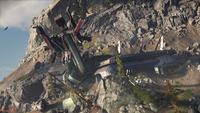C-12 shaped charge: Difference between revisions
From Halopedia, the Halo wiki
No edit summary |
Sith Venator (talk | contribs) |
||
| (99 intermediate revisions by 70 users not shown) | |||
| Line 1: | Line 1: | ||
{{ | {{Status|Canon}} | ||
'''C-12 shaped charges''' are used by the [[United Nations Space Command]] for heavy demolitions, typically as a military explosive. The C-12 compound is extremely dangerous and very volatile. A small 4x4x4 inch cube alone can level a five-story building in seconds. It is solid, but is malleable enough that it can be shaped or bent into different forms to stick to surfaces better and fit into tight spots and is detonated with electric shock detonator sticks or remote detonators. | |||
C-12 is often hefted in medium-sized backpacks called "damage packs" or "blow packs".<ref>'''Halo: Evolutions - Essential Tales of the Halo Universe''', "Blunt Instruments"</ref> Two damage packs contain enough C-12 to blow through three meters of UNSC battleship armor plating.<ref>'''Halo: The Fall of Reach''', ''page 81''</ref> | |||
==Trivia== | |||
As C-4 is short for "Composition 4", it is probable that C-12 means "Composition 12". It is likely that "C-12" is a codename based on the order in which it was developed, not an indicator of its explosive power. In reality, C-2 has more explosive power than C-4, but it is also more unstable, and thus newer compositions were designed for better stability and malleability. | |||
==Gallery== | |||
<gallery> | |||
File:HINF HornOfAbolitionLandslide.png|A destructive landslide caused by a single satchel of C-12 at the [[Horn of Abolition (location)|Horn of Abolition]] on [[Installation 07]]. | |||
</gallery> | |||
==List of appearances== | |||
*''[[Halo: The Fall of Reach]]'' {{1st}} | |||
*''[[Halo: Ghosts of Onyx]]'' | |||
*''[[Halo: Evolutions - Essential Tales of the Halo Universe]]'' | |||
**''[[Blunt Instruments]]'' | |||
*''[[Halo: Retribution]]'' | |||
*''[[Halo Infinite]]'' {{Mo}} | |||
*''[[Halo: Outcasts]]'' | |||
==Sources== | ==Sources== | ||
{{Ref/Sources}} | |||
{{ | {{UNSC ordnance}} | ||
[[Category:Explosives]] | |||
[[Category: | |||
Latest revision as of 01:50, August 9, 2023
C-12 shaped charges are used by the United Nations Space Command for heavy demolitions, typically as a military explosive. The C-12 compound is extremely dangerous and very volatile. A small 4x4x4 inch cube alone can level a five-story building in seconds. It is solid, but is malleable enough that it can be shaped or bent into different forms to stick to surfaces better and fit into tight spots and is detonated with electric shock detonator sticks or remote detonators.
C-12 is often hefted in medium-sized backpacks called "damage packs" or "blow packs".[1] Two damage packs contain enough C-12 to blow through three meters of UNSC battleship armor plating.[2]
Trivia[edit]
As C-4 is short for "Composition 4", it is probable that C-12 means "Composition 12". It is likely that "C-12" is a codename based on the order in which it was developed, not an indicator of its explosive power. In reality, C-2 has more explosive power than C-4, but it is also more unstable, and thus newer compositions were designed for better stability and malleability.
Gallery[edit]
A destructive landslide caused by a single satchel of C-12 at the Horn of Abolition on Installation 07.
List of appearances[edit]
- Halo: The Fall of Reach (First appearance)
- Halo: Ghosts of Onyx
- Halo: Evolutions - Essential Tales of the Halo Universe
- Halo: Retribution
- Halo Infinite (Mentioned only)
- Halo: Outcasts
Sources[edit]
